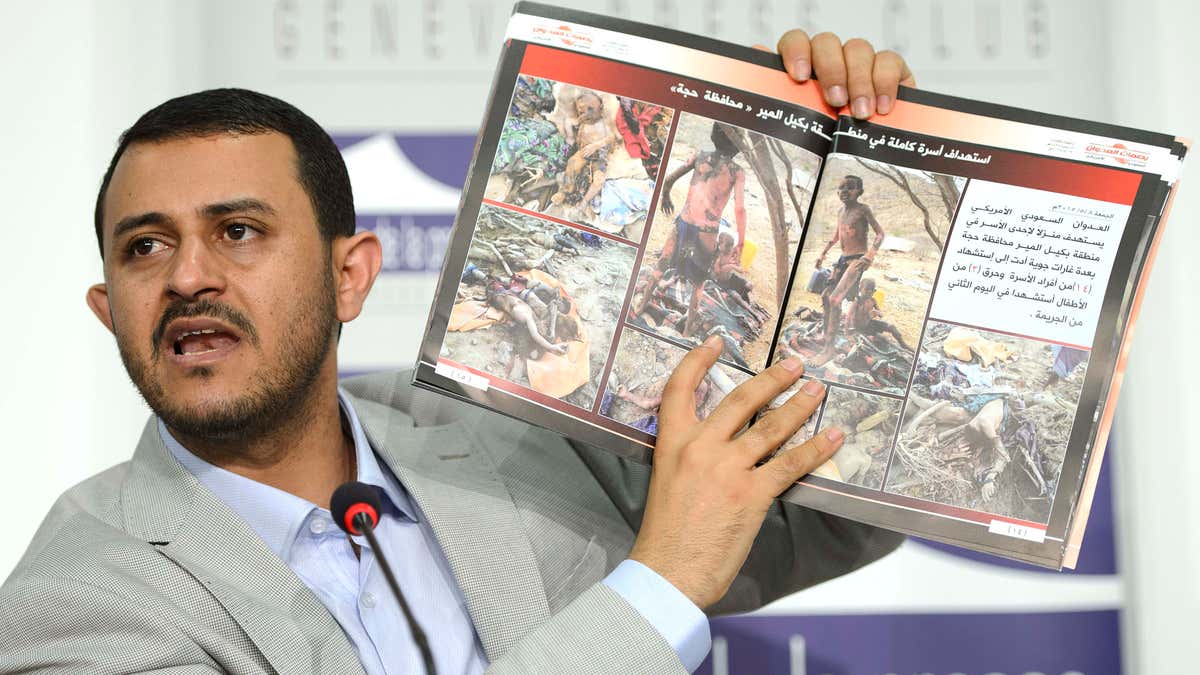
June 18, 2015: Hamza al-Houthim head of the Houthi delegation, shows photographs of injured and killed children as he speaks on human rights during a press conference on the Yemen peace talks at the Geneva Press Club in Geneva, Switzerland. (AP)
SANAA, Yemen – Thousands of people have been diagnosed with dengue fever in southern Yemen, where fighting has raged for months between Shiite rebels and their opponents, international organizations and health officials said Thursday.
The top health ministry official in the southern port city of Aden, al-Khadr Al-Aswar, told The Associated Press that at least 5,000 people have been diagnosed with the mosquito-borne virus. He said mountains of uncollected garbage, along with untreated sewage and heat, have contributed to the spread of the disease.
The World Health Organization said last week that at least 3,000 suspected cases have been reported since March in several provinces, including Ade, with three people dying from the disease. Dengue causes fever, headaches and skin rashes. Potentially lethal cases, mainly in children, involve abdominal pain, vomiting and difficulty breathing, according to the WHO.
The WHO said the last major Yemeni outbreak, with 1,500 confirmed cases, was in 2011 in the western Hodeida governorate.
The fighting in Yemen pits the Shiite rebels, known as Houthis, and military units loyal to former President Ali Abdullah Saleh against an array of forces, including southern separatists, local and tribal militias, Sunni Islamic militants and loyalists of internationally recognized President Abed Rabbo Mansour Hadi. A Saudi-led coalition backed by the United States began carrying out airstrikes against the Houthis and their allies in late March, but has made little progress in pushing them back.
The unrest has killed more than 1,000 civilians, displaced more than a million and led to severe shortages of food, water, fuel and electricity. The lack of fuel has put garbage trucks out of service, and the mounds of uncollected trash incubate mosquitoes that carry the disease.
U.N.-brokered talks are underway in Geneva, where mediators had hoped to secure a cease-fire in time for the Islamic fasting month of Ramadan, which began Thursday.
At a press conference held by Hamza al-Houthi, the head of the rebel delegation, journalists began arguing, pushing and shoving. A reporter from Aden threw her shoe at al-Houthi, who picked it up and threw it back at her.
"Every day our people die and you are holding a press conference," she shouted, as a second fight broke out, with one person waving the flag of formerly-independent South Yemen.
Al-Houthi later told reporters that his delegation wants a temporary truce.
"The humanitarian truce is being negotiated," he said. "The outside assault must stop immediately and the siege must end immediately."
Yemen's exiled Prime Minister Khaled Bahah, who met with Egyptian officials in Cairo on Thursday, said one of the obstacles facing the talks is that the Houthis arrived with some 20 delegates, violating an earlier agreement to bring just seven. He also accused the rebels of blowing up a house belonging to a rival negotiator.
"You have seven houses, blow them up, but we will continue to talk and not fight," he said. "The war is not going to solve Yemen's crisis."
He said his government is looking for a permanent cease-fire, saying an earlier humanitarian pause had allowed the Houthis to grab more territory.
The pace of Saudi-led airstrikes sharply declined on Thursday, with only two reported by witnesses in the rebel-held capital, Sanaa, and Aden. Ground fighting continued in several provinces, including Aden.
In Washington, the U.S. criticized Yemen's government for including an accused al-Qaida financier in its delegation to the peace negotiations.
The State Department said American officials raised concerns with the U.N., but that it blames Hadi's government for including Abdel-Wahab Humayqani in its delegation.
The U.S. added Humayqani to a terror blacklist in 2013 for allegedly financing al-Qaida in the Arabian Peninsula and helping it to expand its foothold in Yemen.
It said at the time that he was "at the center of global support networks that fund and facilitate terrorism," and that he was establishing a political party as a cover for AQAP.
Al-Qaida's Yemeni affiliate is widely seen as the terror network's most dangerous branch. It claimed the January attack on a French satirical magazine, which left 12 dead, and has attempted several attacks on the United States.
The jihadi group has fought against both the Yemeni government and the rebels.
In New York, the United Nations Security Council condemned in the strongest terms "the horrific ... terrorist attacks" on Wednesday in Yemen's rebel-controlled capital that killed at least four people and wounded 60. The council underlined the need to bring to justice the perpetrators of the "heinous" attacks, including at three mosques, which were claimed by the Islamic State extremist group.
